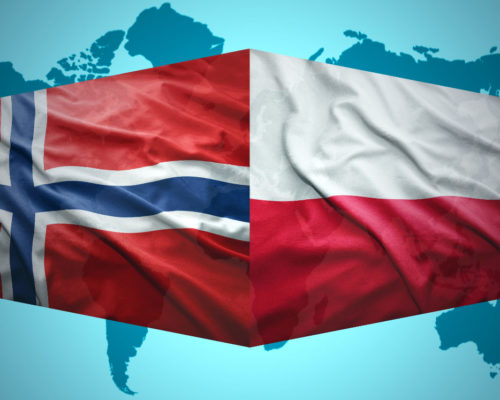
We have been too submissive to foreign investors
Opublikowano: 21 kwietnia 2016
The economic situation in Poland and Polish transformations — a discussion between Roman Mańka and Marek Zuber, analyst and expert in financial markets, leading Polish economist and well-known commentator of economic phenomena.
In the Polish public debate there are two clashing diagnoses regarding Poland’s social and economic situation and also the achievements of the quarter of the century of transformations that started in 1989: one compares Poland to a “green island”; the other states that it is in ruins. Which one is accurate?
The transformations of the last 25 (now 26) years have undoubtedly brought about great accomplishments. This is indisputable. Such assessment stems from the indices for the growth of Gross Domestic Product, and also structure of production, which refers to what is being produced in Poland. The profile of the economy has changed; we managed to increase the proportions in favour of services — most products created in the Polish economy are services. In this respect we came closer to modern economies, considering the point of reference that is the situation present 26 years ago. In addition, GDP per capita has grown substantially, which refers to income per one citizen; the purchasing power of has also increased significantly. Even in the case of the lowest-income families (let’s say, equal to 2000-2500 PLN), the purchasing power these families has improved, so we do have some obvious achievements. We are also perceived better by the outer world. Stability is Poland’s great asset. Compared to the rest of Europe, public finances are carefully controlled. Indeed, there are many things we can boast about.
 If it is as good as you are saying, then where do these negative judgements come from?
If it is as good as you are saying, then where do these negative judgements come from?
There are many things we failed in. Some could have been done better. Quite a lot of issues should have been solved differently than the way in which they were ultimately resolved. Analysing the history of the last 60 years, that is the period lasting since the end of World War II, we can of course observe and list countries that during half of the decade, so within a period comparable to the Polish transformation, were able to accomplish more with respect to the achievement of income per capita. I am talking about countries such as, for instance,
South Korea or Japan. However, we should remember that each of these states had its specificity, therefore it is difficult to come up with explicit analogies, especially in the context of the first example, where there was de facto authoritarian rule, exerting great pressure on economic growth. The number of errors and the scale of corruption in the period of building the economy were immense. Naturally there are some countries that achieved greater economic success than we did, but our achievements are also very impressive. With respect to the states located closer to Poland, in Europe, especially in the region of Central and Eastern Europe, Slovakia achieved greater success than Poland within the last 26 years. It started from a less favourable position; it was poorer than our country, whereas today it is in fact compared with us. In many aspects it is even better than Poland, although
the employment rate here is higher.
What did the Slovaks do differently?
There is a saying that the Slovaks only did what we were saying was supposed to be done. It refers to, say,
the case of flat rate taxation. They were also more efficient at receiving investors, especially at the beginning of the current century. But the Slovaks have their problems too, for example too low diversification of export industries. As well as the said unemployment along with a lack of unskilled workers. Our problem consisted of the fact that we had too little native capital. By the way, it is still a problem today. It would be better if a significantly larger part of the Polish economy, especially in well developing areas, such as the automotive or domestic appliances sectors, was in the hands of Polish investors. It’s possible that if we established relations between business and science differently, or if we defined tax preferences regulations in another way – in the form of financial support or tax exemptions for companies to create own technologies and to make investments in general, we would be able to achieve a higher degree of native entrepreneurs’ participation in the Polish economy. Looking at this from the perspective of the present time, we have also failed in some areas regarding
privatisation. There were some cases of misuse and abuse. We may also wonder whether such a broad privatisation of the banking system was in fact a good idea. We should give our attention to these issues. However, our biggest failure concerns the creation of new jobs for young people.
Do you agree with the opinion that unemployment is one of the most dominating pathologies of transformation?
Unemployment rates in Poland are not bad, especially when we compare them with countries of similar economic
parameters. Yet there is another very important context which cannot be underestimated: more than 2 million Poles — especially the young ones — have fled to Western European economies to work and earn their living there. If we consider this condition, then unfortunately everything does not look so optimistic anymore.
Why do Poles flee their own country, disavowing the economic success of the last 26 years?
One thing that has not worked out in Poland is redistribution. We forgot that success is something that should be shared. It turned out that the biggest problem of the transformation consisted of the fact that a too limited part of the society benefitted from economic growth. However, it is not a clear-cut situation if we consider it in an alternative setting. In the public debate we often hear the accusations that Poles earn too little, that the salaries do not correspond to work output, that in the period of social and economic transformations the salaries were too low. This is all true, but what alternative was there?
It is said that Poland was developing thanks to two factors: exploitation and funds from the European Union. The second factor is compared by some to anabolic steroids, drugs sometimes used by athletes.
Surely European funds were a significant incentive contributing to increased economic growth in Poland, whereas with respect to exploitation it is not that obvious. We should always refer to an alternative. We need to ask ourselves the question, how could the economic growth have been achieved differently? What instead of exploitation – meaning low salaries, and looking from the other side, the competitiveness of the Polish economy – could serve as the source of development? There was no other factor. Poland entering the 90’s in the 20th century had no industry or capital. This was the biggest problem. A massive part of industrial structures was uncompetitive.
 Another theory is also being forced through stating that the Polish industry was deliberately destroyed in the course of privatisation to ruin some specific factories or plants and then sell them at a low price.
Another theory is also being forced through stating that the Polish industry was deliberately destroyed in the course of privatisation to ruin some specific factories or plants and then sell them at a low price.
Indeed, in the sphere of privatisation there were some scams, but leaving aside this negative phenomenon Poland had no capital that was required to set up its own enterprises. And it is still lacking this immanent capital to this day. This is one of the essential barriers to economic growth in Poland. Therefore, to all those who claim that the economic success came at the expense of exploitation, I would like to say honestly, there was no other way. Low costs of labour were an essential factor contributing to the economic growth. It was in this way that our economy became competitive.
I’ll give you an example. We are complaining that we don’t have a Polish car. But for the newest model of Volvo
to get ready and go into production, after being built virtually from scratch, mainly thanks to the capital of the new Indian owner, cost about 8 billion euro, which means over 30 billion PLN. Can you imagine a Polish company, or even a group of companies who would be able to collect such means? And it’s but one type of car…
What was the course of the Polish transformation as compared to Europe and the world?
I would mention three important periods: the first phase of getting the foreign stakeholders involved in Polish
transformations was oriented towards the attempt of using the demand of a 40-million nation, meaning that the investments in retail networks were being forced through, which as we remember was not very well received; then there was the second stage, directed at serious and strategic investments such as construction of large, often very advanced plants, which is evident in the automotive and domestic appliances sectors — this was related to the implementation of cutting-edge engineering ideas in Poland, and also the creation of new jobs. Now we are heading towards the third period of Polish economic growth, and this is a critical moment. Sooner or later the Polish economy will cease to be competitive in terms of costs of production, hence there may be problems with maintaining economic growth. This third stage needs to be based on our own initiatives, projects, concepts, patents and technologies. We still have a dozen or so years to get to this period smoothly, but this is not that long. In this context, providing support to Polish engineering ideas and concepts is of the utmost importance.
And why have we not supported these Polish engineering ideas for the last 26 years, since the beginning of the transformation?
I will answer your question with a question: from what, for what and with what funds? Projects regarding development of our own technologies are expensive. It is not a matter of simply allocating 100 million. It is counted in billions. We need billions for this. I will give you one example: Japanese company “Toyota”, concerned only with development-related plans – I am talking about ideas, not production of cars – spends 5 billion euro per year. The major cause of the deadlock of the Polish state in the scope of the generation of new technologies was the
lack of funds. There were also some other reasons. We should admit that there were some mistakes made in the distribution of available financial resources, which was undoubtedly a huge issue. Other drawbacks were the absence of policy for supporting innovations from the state budget, even in the form of tax reliefs for innovative enterprises, as well as failure to set up proper relations between science and business. Indeed, regulations  regarding cooperation between the education system and business have not been adopted until this year.
regarding cooperation between the education system and business have not been adopted until this year.
So there were no other sources of economic growth apart from low labour costs, hence exploitation, and the funds from the European Union?
The thesis stating that the Polish economy was developing thanks to low labour costs and subsidies from the European Union is accurate to a large extent. But again, we are coming back to the opening questions: there was no other alternative. However, we need to make one significant reservation: in the pursuit of the competitiveness of the Polish economy by carrying out the policy of total submission to demands and expectations, also with regard to the newly created laws, we have probably gone too far. The example of Hungary shows that some adjustments were possible. The fact that Viktor Orbán won the election in Hungary shattered a certain stereotype. For years of the social and economic transformations in Poland there was a dominating dogma that we
should keep discipline towards economic instructions coming from Eastern Europe, or otherwise we would expose ourselves to the risk of economic ostracism. Nowadays we can no longer treat this thesis as something obvious. In the economic policy of Hungary, Orbán departed from accepted patterns and the world did not turn its back on the Hungarians.
Investors are pragmatic; they calculate their own interest, even when countries implement controversial economic projects. The do not flee Hungary, but head there. The best example is “Mercedes” and its decision to extend the plant. The Hungarian experience should teach us something. Until now we have been too submissive to foreign investors, say, in the scope of law enforcement, for example with respect to international concerns with lowering personal income tax or moving it to other countries. A question is still open as to what extent this was the result of conscious decisions of the Polish government forced by lobbying, and to what extent this was caused by a simple lack of knowledge.
Udostępnij ten post:
-
Dear Sir. Poland without foreign investors will be like Ukraine pós-war. Keep the strategy and in 2020 we can talk again.






Dodaj komentarz